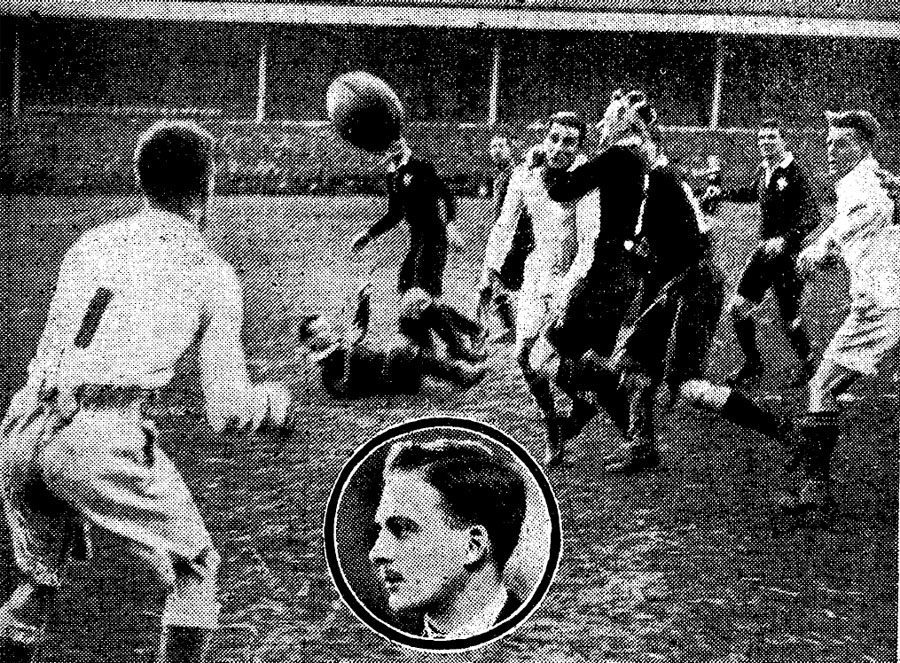January 20 down the years
The fastest international try ... and a different kind of speed
England clear the ball in their battling win over Wales in 1923 - Alastair Smallwood (inset) scored the vital four-point drop-goal to seal the victory © Scrum.com
1923
Flanker Leo Price scored the then fastest try in an international, touching down for England ten seconds after their kick-off against Wales. England won 7-3 but had to defend against endless Welsh attacks - "a siege unparalleled in international rugby" according to the Daily Mail - before a four-point drop-goal scored by wing Alastair Smallwood knocked the fight out of them.
2009
The RFU confirmed that Bath and England prop Matt Stevens had failed a doping test following Bath's Heineken Cup match with Glasgow the previous December. Stevens was suspended from playing in all competitions and removed from the England Elite Player Squad for the Six Nations. "I was tested for a prohibited substance but it's not performance enhancing, so you can take what you want from that," he said. He was subsequently banned from the game for two years, a decision he did not appeal.
1973
Tom Grace's last-minute try for Ireland brought them a 10-10 draw against New Zealand at Lansdowne Road, Ireland's best result against the All Blacks to date. Ireland could have snatched a sensational victory but Barry McGann's penalty five minutes from time fell inches short in the face of a strong wind. "I thought I'd allowed for the strength of the wind. I suppose I'll regret forever missing that one kick." Yes, Barry, you will.
1973
In Cardiff, Wales beat England for the fifth year running, easing to a 25-9 win. The margin would have been greater had Phil Bennett not uncharacteristically missed three penalties and three conversions. "I wore new boots and the studs came through into my heels, causing blisters," he said. "I changed them in the second half, but by this time my concentration had been upset."
1990
Rory Underwood became the leading Test try scorer for England, crossing in their 23-0 demolition of Ireland at Twickenham to overtake the record (18 tries) set by Cyril Lowe between 1913 and 1923. Ireland tackled their socks off to keep the score to 7-0 until ten minutes from time as England ran in three tries in quick succession.
1968
Gareth Edwards scored his first try for Wales, helping them to an 11-11 draw against England at Twickenham. Kevin Jarrett missed four out of five penalty attempts for Wales.
1912
Welsh scrum-half Dicky Owen played his 34th international for Wales, overtaking the national record set 11 years earlier by Billy Bancroft. Owen was Wales's captain in an 8-0 Twickenham defeat, his penultimate Test before retiring aged 34.
1934
The new grandstand on the North side of Cardiff Arms Park was officially opened for England's 9-0 victory over a Welsh side that contained 13 new caps. The stand became an integral part of the Cardiff site until demolition in 1968. Winger Graham Meikle was the key figure in England's victory, crossing for two tries.
1990
France ran in five tries to Wales' one as they romped to a 29-19 win in Cardiff, the home side's cause undone by the sending off of Kevin Moseley for stamping. The Five Nations committee, which had made clear its determination to clamp down on discipline, handed Moseley a then-record 32-week ban.
1979
Wales proved that it was business as usual in the Five Nations despite some high-profile retirements. They launched a fourth successive Triple Crown season with a 19-13 victory over Scotland at Murrayfield. In Dublin, Ireland draw 9-9 with France.
© Scrum.com


